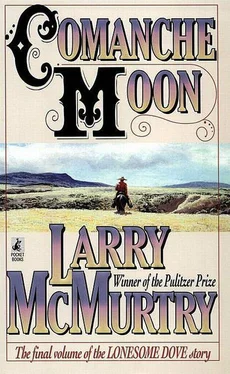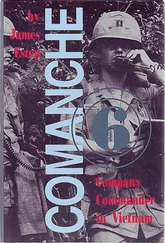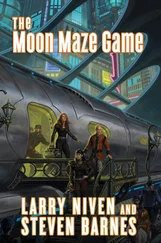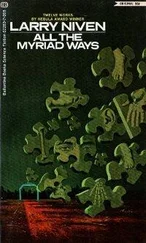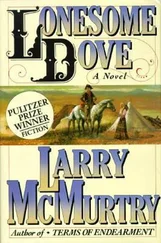Kicking Wolf was very angry. He had half expected to die when he had decided to bring the Buffalo Horse to Mexico. He knew that Ahumado was a very dangerous man who killed on whim, that death might be waiting for him in the canyon of the Yellow Cliffs. Besides, Three Birds had talked of little else on the trip except his conviction that Ahumado would kill them.
What he had not expected was that he would be spared and Three Birds taken. It angered him so that he had a notion to put an arrow through the old bandit immediately. Did he think a Comanche warrior would simply surrender his friend to torture and death? By that one stroke Ahumado made him seem a fool, the very thing Three Birds had been telling him he was, all the way south.
To make matters worse, Three Birds accepted the decision. He was already singing his death song and his eyes were looking far away.
As Kicking Wolf was about to draw his bow he saw three pistoleros to his left--they rose out of the rocks with their rifles pointed at him. Three more rose behind Ahumado.
"In my country rocks grow men," Ahumado said.
Kicking Wolf dropped his weapons and made a gesture of surrender. He could not simply walk out of the canyon and leave Three Birds to his death. If it was to be death for one, it would be death for both. But Ahumado made a gesture with his hand and several horsemen rode out of the rocks swinging horsehide ropes. Kicking Wolf tried to run but before he could escape three lassos caught him. The horsemen began to drag him over the rough ground, out of the canyon. He could not see Three Birds for the dust his own body raised as the men spurred their horses and pulled him faster. They pulled him through a field of big rocks. Then his head hit one of the big rocks, which sent him into a black sleep. But, even as he sank into the darkness he thought he heard someone singing a death song.
When Buffalo Hump came into the big store in Austin, some of the warriors had found an old woman upstairs and had pulled her and had thrown her down the steps. Now they were dragging her through some white flour. They had killed the old man who owned the store with one of his own axes and had used the axe to chop open a couple of barrels of white flour. Some of the young warriors had never seen white flour and took delight in throwing it in the air and covering themselves with it. They also liked dragging the old woman through it while she shrieked.
Two of the young warriors outraged her while Buffalo Hump picked out a few hatchets and put them in a sack. Then he came over and waited for the warrior who was outraging the old woman to finish. The woman's husband was lying dead only a few feet away, while, outside, his warriors were setting buildings afire and killing people as they tried to escape the flames. Some warriors rode their horses into white people's houses and looted everything they could carry. Six Texans were shot down in the street and scalped where they fell. The people of Austin ran like chickens and the Comanches pursued them like wolves, killing them as they ran with lances, or arrows, or tomahawks.
The raid had begun just at dawn but now the sun was well up. Buffalo Hump knew it was time to leave. The young men would have to throw away much of the loot they carried; they would not be able to carry it if there was a fast pursuit. They had killed four rangers in one little house but had seen no soldiers.
When the warrior got off the old, flour-splotched woman Buffalo Hump stood over her and shot three arrows into her chest. He shot them with all the force of his bow, so that the arrows went through the woman and nailed her to the floor. The woman died immediately, but Buffalo Hump didn't scalp her. She was just an old woman whose thin hair was worthless.
He let his men take what baubles they wanted from the store, but told them to hurry. When he came outside he saw that some of his warriors had caught a blacksmith and were burning him to death on his own forge. One of them pumped the bellows and made the flames leap while the blacksmith screamed. The high flames set the man's hair on fire.
In the street a young man with no trousers was running, pursued by three warriors. They had stolen ropes from the big store and were trying to rope him, as a vaquero would rope a cow. But they were warriors, not ropers, and they kept missing.
Finally, unable to rope the young man, the warriors began to whip him with their ropes.
Then Red Cat joined the fun. He had stolen an axe with a long handle from the store. While the young man was fleeing, Red Cat swung the axe and tried to cut the young man's head off. The blow killed him but his head was still on his neck. The warriors dragged him around for a while, to make sure he was dead. Then Red Cat finished cutting his head off and they threw his body in a wagon, along with some other bodies.
Buffalo Hump saw an old man rolling around in the street--he was dying but not quite dead. He rode over and did what he had done with the old woman with flour on her: he shot three arrows into the old man so hard that they went through him and pinned him to the ground.
Buffalo Hump meant to do the same thing again, as they went south. At every farm or ranch he would put arrows through some Texan. He would leave them nailed to the floor, or to the ground.
It would be a thing the Texans would notice--a thing they would remember him by.
When Maggie was awakened in the first gray light by the high, wild cries of the Comanche warriors, racing into Austin, she didn't even wait to look out the window. Their war cries had been in her nightmares for years. She grabbed a little pistol Woodrow had left her for her own defense and raced barefoot down the stairs. The house she boarded in was on the main street--she knew they would catch her if she stayed in it but she thought she might be able to squeeze under the smokehouse behind it. An old sow had rooted under the smokehouse so persistently that she had dug out a shallow wallow under the back corner of the shack.
Maggie raced down the steps and, moments later, was squeezing herself under the smokehouse. There was room, too: the black sow was larger than she was. She clutched the pistol and cocked it to be ready. Woodrow had long ago taught her where to shoot herself, to spare herself torture and outrage.
Once Maggie had squeezed herself as far back under the house as she could get, she heard, from behind her somewhere, the buzz of a rattlesnake, at which point she stopped and remained motionless. The snake didn't seem close, but she didn't want to do anything to irritate it further.
She didn't want to kill herself, either. It would mean the end not only for herself but for the child inside her too. She knew what happened to women the Comanches took, though. Only yesterday she had seen poor Maudy Clark, sitting on a chair behind the church, looking blank. The preacher was letting her sleep in a little room in the church until they located a sister in Georgia who might take her in. Her husband, William, had come one day in a wagon, taken the children, and left without speaking a ^w to Maudy. He had simply ridden away, as if his wife had ceased to exist: and his attitude was what most men's would be. Once fouled by a Comanche or a Kiowa or any Indian, a woman might as well be dead, for she would be considered so by respectable society.
Maggie didn't know that she could be befouled much worse by an Indian than she had been by some of the rough men who had used her; but, then, there were the tortures: she didn't think she could stand them.
She clutched her pistol but otherwise didn't move. The snake's rattling slowly quieted-- probably the rattler had crawled off into a corner. Slowly, very deliberately, Maggie squeezed herself a few more inches back. Then she put her face down; Woodrow had told her Comanches were quick to spot even the smallest flash of white skin.
Читать дальше
